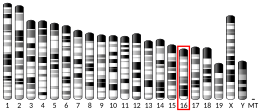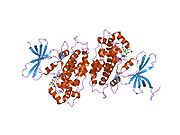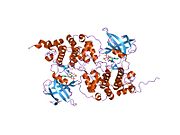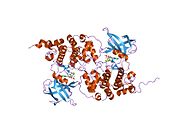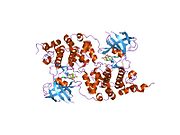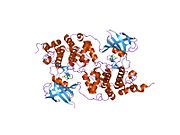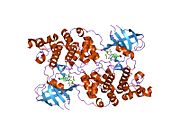Glycogen synthase kinase-3 beta, (GSK-3 beta), is an enzyme that in humans is encoded by the GSK3B gene. In mice, the enzyme is encoded by the Gsk3b gene. Abnormal regulation and expression of GSK-3 beta is associated with an increased susceptibility towards bipolar disorder.
Function
Glycogen synthase kinase-3 (GSK-3) is a proline-directed serine-threonine kinase that was initially identified as a phosphorylating and an inactivating agent of glycogen synthase. Two isoforms, alpha (GSK3A) and beta, show a high degree of amino acid homology. GSK3B is involved in energy metabolism, neuronal cell development, and body pattern formation. It might be a new therapeutic target for ischemic stroke.
Disease relevance
Homozygous disruption of the Gsk3b locus in mice results in embryonic lethality during mid-gestation. This lethality phenotype could be rescued by inhibition of tumor necrosis factor.
Two SNPs at this gene, rs334558 (-50T/C) and rs3755557 (-1727A/T), are associated with efficacy of lithium treatment in bipolar disorder.
Signaling pathways
Pharmacological inhibition of ERK1/2 restores GSK-3 beta activity and protein synthesis levels in a model of tuberous sclerosis.
Interactions
GSK3B has been shown to interact with:
- AKAP11,
- AXIN1,
- AXIN2,
- AR,
- CTNNB1,
- DNM1L,
- MACF1
- MUC1,
- SMAD3
- NOTCH1,
- NOTCH2,
- P53,
- PRKAR2A,
- SGK3, and
- TSC2.
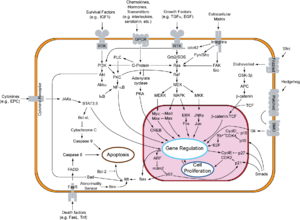
See also
References
- ^ GRCh38: Ensembl release 89: ENSG00000082701 – Ensembl, May 2017
- ^ GRCm38: Ensembl release 89: ENSMUSG00000022812 – Ensembl, May 2017
- "Human PubMed Reference:". National Center for Biotechnology Information, U.S. National Library of Medicine.
- "Mouse PubMed Reference:". National Center for Biotechnology Information, U.S. National Library of Medicine.
- ^ Stambolic V, Woodgett JR (November 1994). "Mitogen inactivation of glycogen synthase kinase-3 beta in intact cells via serine 9 phosphorylation". The Biochemical Journal. 303 (Pt 3): 701–4. doi:10.1042/bj3030701. PMC 1137602. PMID 7980435.
- Lau KF, Miller CC, Anderton BH, Shaw PC (September 1999). "Molecular cloning and characterization of the human glycogen synthase kinase-3beta promoter". Genomics. 60 (2): 121–8. doi:10.1006/geno.1999.5875. PMID 10486203.
- ^ Hoeflich KP, Luo J, Rubie EA, Tsao MS, Jin O, Woodgett JR (July 2000). "Requirement for glycogen synthase kinase-3beta in cell survival and NF-kappaB activation". Nature. 406 (6791): 86–90. Bibcode:2000Natur.406...86H. doi:10.1038/35017574. PMID 10894547. S2CID 205007364.

- Luykx JJ, Boks MP, Terwindt AP, Bakker S, Kahn RS, Ophoff RA (June 2010). "The involvement of GSK3beta in bipolar disorder: integrating evidence from multiple types of genetic studies". European Neuropsychopharmacology. 20 (6): 357–68. doi:10.1016/j.euroneuro.2010.02.008. PMID 20226637. S2CID 43214075.
- Plyte SE, Hughes K, Nikolakaki E, Pulverer BJ, Woodgett JR (December 1992). "Glycogen synthase kinase-3: functions in oncogenesis and development". Biochimica et Biophysica Acta (BBA) - Reviews on Cancer. 1114 (2–3): 147–62. doi:10.1016/0304-419X(92)90012-N. PMID 1333807.
- "Entrez Gene: GSK3B glycogen synthase kinase 3 beta".
- Iwahashi K, Nishizawa D, Narita S, Numajiri M, Murayama O, Yoshihara E, et al. (2013). "Haplotype analysis of GSK-3β gene polymorphisms in bipolar disorder lithium responders and nonresponders". Clinical Neuropharmacology. 37 (4): 108–10. doi:10.1097/WNF.0000000000000039. PMC 4206383. PMID 24992082.
- Pal R, Bondar VV, Adamski CJ, Rodney GG, Sardiello M (June 2017). "Inhibition of ERK1/2 Restores GSK3β Activity and Protein Synthesis Levels in a Model of Tuberous Sclerosis". Scientific Reports. 7 (1): 4174. Bibcode:2017NatSR...7.4174P. doi:10.1038/s41598-017-04528-5. PMC 5482840. PMID 28646232.
- EMBL-EBI. "EMBL European Bioinformatics Institute". www.ebi.ac.uk. Retrieved 2017-04-26.
- Gonnot F, Boulogne L, Brun C, Dia M, Gouriou Y, Bidaux G, et al. (June 2023). "SERCA2 phosphorylation at serine 663 is a key regulator of Ca homeostasis in heart diseases". Nature Communications. 14 (1): 3346. doi:10.1038/s41467-023-39027-x. PMC 10250397. PMID 37291092.
- ^ Tanji C, Yamamoto H, Yorioka N, Kohno N, Kikuchi K, Kikuchi A (October 2002). "A-kinase anchoring protein AKAP220 binds to glycogen synthase kinase-3beta (GSK-3beta ) and mediates protein kinase A-dependent inhibition of GSK-3beta". The Journal of Biological Chemistry. 277 (40): 36955–61. doi:10.1074/jbc.M206210200. PMID 12147701.
- ^ Mak BC, Takemaru K, Kenerson HL, Moon RT, Yeung RS (February 2003). "The tuberin-hamartin complex negatively regulates beta-catenin signaling activity". The Journal of Biological Chemistry. 278 (8): 5947–51. doi:10.1074/jbc.C200473200. PMID 12511557.
- Nakamura T, Hamada F, Ishidate T, Anai K, Kawahara K, Toyoshima K, et al. (June 1998). "Axin, an inhibitor of the Wnt signalling pathway, interacts with beta-catenin, GSK-3beta and APC and reduces the beta-catenin level". Genes to Cells. 3 (6): 395–403. doi:10.1046/j.1365-2443.1998.00198.x. PMID 9734785. S2CID 10875463.
- von Kries JP, Winbeck G, Asbrand C, Schwarz-Romond T, Sochnikova N, Dell'Oro A, et al. (September 2000). "Hot spots in beta-catenin for interactions with LEF-1, conductin and APC". Nature Structural Biology. 7 (9): 800–7. doi:10.1038/79039. PMID 10966653. S2CID 40432152.
- Schwarz-Romond T, Asbrand C, Bakkers J, Kühl M, Schaeffer HJ, Huelsken J, et al. (August 2002). "The ankyrin repeat protein Diversin recruits Casein kinase Iepsilon to the beta-catenin degradation complex and acts in both canonical Wnt and Wnt/JNK signaling". Genes & Development. 16 (16): 2073–84. doi:10.1101/gad.230402. PMC 186448. PMID 12183362.
- Wang L, Lin HK, Hu YC, Xie S, Yang L, Chang C (July 2004). "Suppression of androgen receptor-mediated transactivation and cell growth by the glycogen synthase kinase 3 beta in prostate cells". The Journal of Biological Chemistry. 279 (31): 32444–52. doi:10.1074/jbc.M313963200. PMID 15178691.
- Davies G, Jiang WG, Mason MD (April 2001). "The interaction between beta-catenin, GSK3beta and APC after motogen induced cell-cell dissociation, and their involvement in signal transduction pathways in prostate cancer". International Journal of Oncology. 18 (4): 843–7. doi:10.3892/ijo.18.4.843. PMID 11251183.
- Kishida S, Yamamoto H, Hino S, Ikeda S, Kishida M, Kikuchi A (June 1999). "DIX domains of Dvl and axin are necessary for protein interactions and their ability to regulate beta-catenin stability". Molecular and Cellular Biology. 19 (6): 4414–22. doi:10.1128/mcb.19.6.4414. PMC 104400. PMID 10330181.
- Hong YR, Chen CH, Cheng DS, Howng SL, Chow CC (August 1998). "Human dynamin-like protein interacts with the glycogen synthase kinase 3beta". Biochemical and Biophysical Research Communications. 249 (3): 697–703. doi:10.1006/bbrc.1998.9253. PMID 9731200.
- Wu X, Shen QT, Oristian DS, Lu CP, Zheng Q, Wang HW, et al. (February 2011). "Skin stem cells orchestrate directional migration by regulating microtubule-ACF7 connections through GSK3β". Cell. 144 (3): 341–52. doi:10.1016/j.cell.2010.12.033. PMC 3050560. PMID 21295697.
- Li Y, Bharti A, Chen D, Gong J, Kufe D (December 1998). "Interaction of glycogen synthase kinase 3beta with the DF3/MUC1 carcinoma-associated antigen and beta-catenin". Molecular and Cellular Biology. 18 (12): 7216–24. doi:10.1128/mcb.18.12.7216. PMC 109303. PMID 9819408.
- Li Y, Kuwahara H, Ren J, Wen G, Kufe D (March 2001). "The c-Src tyrosine kinase regulates signaling of the human DF3/MUC1 carcinoma-associated antigen with GSK3 beta and beta-catenin". The Journal of Biological Chemistry. 276 (9): 6061–4. doi:10.1074/jbc.C000754200. PMID 11152665.
- Guo X, Ramirez A, Waddell DS, Li Z, Liu X, Wang XF (January 2008). "Axin and GSK3- control Smad3 protein stability and modulate TGF- signaling". Genes & Development. 22 (1): 106–20. doi:10.1101/gad.1590908. PMC 2151009. PMID 18172167.
- Foltz DR, Santiago MC, Berechid BE, Nye JS (June 2002). "Glycogen synthase kinase-3beta modulates notch signaling and stability". Current Biology. 12 (12): 1006–11. Bibcode:2002CBio...12.1006F. doi:10.1016/S0960-9822(02)00888-6. PMID 12123574. S2CID 15884556.
- Espinosa L, Inglés-Esteve J, Aguilera C, Bigas A (August 2003). "Phosphorylation by glycogen synthase kinase-3 beta down-regulates Notch activity, a link for Notch and Wnt pathways". The Journal of Biological Chemistry. 278 (34): 32227–35. doi:10.1074/jbc.M304001200. PMID 12794074.
- Watcharasit P, Bijur GN, Zmijewski JW, Song L, Zmijewska A, Chen X, et al. (June 2002). "Direct, activating interaction between glycogen synthase kinase-3beta and p53 after DNA damage". Proceedings of the National Academy of Sciences of the United States of America. 99 (12): 7951–5. Bibcode:2002PNAS...99.7951W. doi:10.1073/pnas.122062299. PMC 123001. PMID 12048243.
- Dai F, Yu L, He H, Chen Y, Yu J, Yang Y, et al. (May 2002). "Human serum and glucocorticoid-inducible kinase-like kinase (SGKL) phosphorylates glycogen syntheses kinase 3 beta (GSK-3beta) at serine-9 through direct interaction". Biochemical and Biophysical Research Communications. 293 (4): 1191–6. doi:10.1016/S0006-291X(02)00349-2. PMID 12054501.
- Inoki K, Ouyang H, Zhu T, Lindvall C, Wang Y, Zhang X, et al. (September 2006). "TSC2 integrates Wnt and energy signals via a coordinated phosphorylation by AMPK and GSK3 to regulate cell growth". Cell. 126 (5): 955–68. doi:10.1016/j.cell.2006.06.055. PMID 16959574. S2CID 16047397.
Further reading
- Turenne GA, Price BD (2001). "Glycogen synthase kinase3 beta phosphorylates serine 33 of p53 and activates p53's transcriptional activity". BMC Cell Biology. 2: 12. doi:10.1186/1471-2121-2-12. PMC 35361. PMID 11483158.
- Plyte SE, Hughes K, Nikolakaki E, Pulverer BJ, Woodgett JR (December 1992). "Glycogen synthase kinase-3: functions in oncogenesis and development". Biochimica et Biophysica Acta (BBA) - Reviews on Cancer. 1114 (2–3): 147–62. doi:10.1016/0304-419X(92)90012-N. PMID 1333807.
- Morishima-Kawashima M, Hasegawa M, Takio K, Suzuki M, Yoshida H, Watanabe A, et al. (1995). "Hyperphosphorylation of tau in PHF". Neurobiology of Aging. 16 (3): 365–71, discussion 371–80. doi:10.1016/0197-4580(95)00027-C. PMID 7566346. S2CID 22471158.
- Jope RS, Bijur GN (2002). "Mood stabilizers, glycogen synthase kinase-3beta and cell survival". Molecular Psychiatry. 7 (Suppl 1): S35-45. doi:10.1038/sj.mp.4001017. PMID 11986994.
- Bhat RV, Budd SL (2003). "GSK3beta signalling: casting a wide net in Alzheimer's disease". Neuro-Signals. 11 (5): 251–61. doi:10.1159/000067423. PMID 12566926. S2CID 13650262.
- Wang W, Li M, Wang Y, Li Q, Deng G, Wan J, et al. (December 2016). "GSK-3β inhibitor TWS119 attenuates rtPA-induced hemorrhagic transformation and activates the Wnt/β-catenin signaling pathway after acute ischemic stroke in rats". Molecular Neurobiology. 53 (10): 7028–7036. doi:10.1007/s12035-015-9607-2. PMC 4909586. PMID 26671619.
- Nadri C, Kozlovsky N, Agam G (September 2003). "". Harefuah. 142 (8–9): 636–42, 644. PMID 14518171.
- Mulholland DJ, Dedhar S, Wu H, Nelson CC (January 2006). "PTEN and GSK3beta: key regulators of progression to androgen-independent prostate cancer". Oncogene. 25 (3): 329–37. doi:10.1038/sj.onc.1209020. PMID 16421604.
External links
- PDBe-KB provides an overview of all the structure information available in the PDB for Human Glycogen synthase kinase-3 beta (GSK3B)
| PDB gallery | |
|---|---|
|
| Kinases: Serine/threonine-specific protein kinases (EC 2.7.11-12) | |||||||||||||||||||||||||||||||||||||||||||||||
|---|---|---|---|---|---|---|---|---|---|---|---|---|---|---|---|---|---|---|---|---|---|---|---|---|---|---|---|---|---|---|---|---|---|---|---|---|---|---|---|---|---|---|---|---|---|---|---|
| |||||||||||||||||||||||||||||||||||||||||||||||
| |||||||||||||||||||||||||||||||||||||||||||||||
| |||||||||||||||||||||||||||||||||||||||||||||||
| Enzymes | |
|---|---|
| Activity | |
| Regulation | |
| Classification | |
| Kinetics | |
| Types |
|




